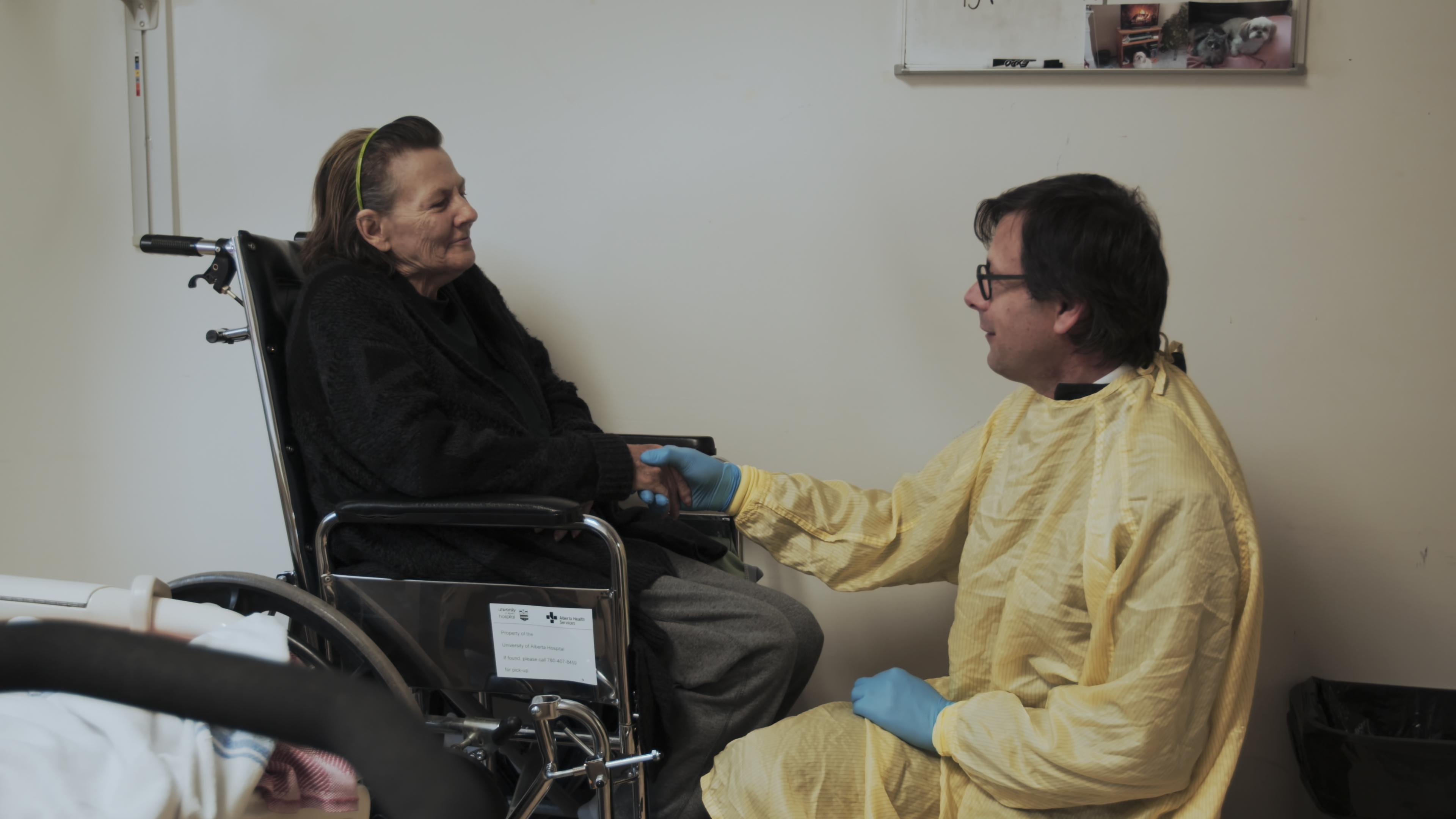
James Shapiro meets a patient following her transplant operation
James Shapiro can't pinpoint exactly when he knew he wanted to be a surgeon. The pull towards the operating theatre was always there. The son of a family physician, he remembers rummaging through his dad's office as a child, immersed in a world of possibility.
"I was completely fascinated-not so much at that point by the medicine aspect-but all the things you could do to patients. It was a bit frightening really seeing all the instruments and needles and scalpels. But I was completely obsessed with that and I knew I wanted to be a surgeon."
Decades have since passed, but Shapiro's fascination has only grown with time. Today a professor of surgery in the Faculty of Medicine & Dentistry and a liver transplant surgeon at the University of Alberta Hospital, Shapiro's days herald both hope and heartbreak for the many patients and families he works with.
It is a life filled with purpose that he would not change. But for Shapiro, there is also profound frustration-that for as many lives as he can save, there are far more he can't.
"We have a shortage of organ donors in Canada," says Shapiro. "Although we've done a lot of transplants, every year up until now about a quarter of the patients have died on our waiting lists before transplantation because there just haven't been livers to go around."
A new documentary, airing on CBC's The Nature of Things Thursday, November 17, aims to re-energize the discussion about organ donations among Canadians. Narrated by David Suzuki, the film called Vital Bonds is a co-production by the National Film Board of Canada and ID: Productions. The film is directed by Edmonton filmmaker and U of A alumnus Niobe Thompson and produced by Rosvita Dransfeld.
Shapiro is one of the surgeons featured in Vital Bonds which gives unprecedented access to the real-life stories of Canadian organ donors and recipients over a five-month period at the University of Alberta Hospital, one of the busiest transplant hospitals in Canada.
"Uniquely, Niobe was able to get his team in to film all of the conversations that happened with donor families around someone dying," says Shapiro. "There are heart-wrenching scenes that were captured. They are unbelievable. There is one scene with a mom saying goodbye to her son [after it became clear he would not live and a decision has been made to donate his organs]. He's being rushed down to the operating room and you see the doors closing and her saying goodbye."
"You can't help but get choked up by that. That's how desperate and brave that decision was to donate."
"Vital Bonds is ultimately a story about humans caught up in the transplant world and of the doctors who help them," says Niobe Thompson, writer and director. "We believe the audience will be deeply moved by what they see. And ultimately, the generosity to donate organs is a power that comes out of empathy. We hope this documentary creates empathy."
According to the Canadian Transplant Society, Canada's organ donation rate is among the lowest in the industrialized world. While 90 per cent of Canadians support organ donation, less than 20 per cent have made plans to donate. In actual numbers, only 18 out of every one million Canadians will ultimately become an organ donor. This despite the fact that more than 1,600 Canadians are added to organ wait lists each year.
Shapiro believes Canada can do better.
"We need a better system of donation and we need the general public to be more acutely aware of the desperate need for organ donors."
"We have a shortage of organ donors in Canada. Although we've done a lot of transplants, every year up until now about a quarter of the patients have died on our waiting lists before transplantation because there just haven't been livers to go around." -James Shapiro
Work is underway on various fronts to increase donor rates. One initiative Shapiro sees promise in is the increased implementation of donation after cardiocirculatory death (DCD) programs across Canada. Such programs offer families the option of their loved ones becoming an organ donor in cases where their death is certain and care will be withdrawn.
"In that situation it is a very hard decision for the family. It's made a lot easier when the family knows that's what the patient wished to do," says Shapiro. "DCD donors have increased enormously in several centres around the world. But it has been very slow to move forward here in Alberta. That is a major area that I think we need to push for now."
While the thought of making such decisions may be difficult, Shapiro has seen their importance first hand. A single donor can save up to eight lives.
"A short time ago I came across a young girl," recalls Shapiro. "She was five years old. Her mum came up to me and said, 'Do you remember my child?'"
Five years earlier the girl had been one Shapiro's patients in need of a complex operation. In a short time she underwent two liver transplants, an intricate vein reconstruction and endured several major complications in between.
"She really was knocking at death's door," remembers Shapiro. "At the time of a surgery, all the surgeons involved completely focus on the event, saving somebody's life and dealing with the next problem as it comes up. You sometimes forget the long-term impact."
"But last Sunday, there was a gorgeous, beautiful five-year-old girl, clearly having a normal life. It made me realize once again that what we do has a big impact on patients and their lives."
Vital Bonds premieres Thurs., Nov. 17 at 8 p.m. on CBC Television's The Nature of Things with David Suzuki.